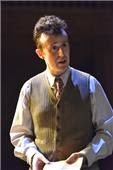Jasper Britton (Barabas)
and Catrin Stewart (Abigail). Photo: Ellie Kurtz
Reviewed by James Karas
The Royal Shakespeare Company has
produced a vibrant and engaging production of Christopher Marlowe’s The
Jew of Malta. Director Justin Audibert paces the performance well and
Lucy Cullingford who is credited with movement has indeed choreographed part of
the performance to the energetic music of Jonathan Girling.
Audibert directs with a light and at times enthusiastic
touch and the production has the feel of an action-packed play with a plot of
many twists.
The Jew of the title is Barabas
(Jasper Britton), a rich merchant in Malta during the siege of the island by
the Turks. His property is confiscated by the Christian Governor Ferneze
(Steven Pacey) in order to bribe the Turks. This sets in motion a series of
intrigues, murders, poisonings, treacheries and blackmails to make your head spin.
The most notable performance is
given by Britton in the lead role. Barabas is unscrupulous, devious, tough and
murderous to be sure but he has panache as well. This puts him in a different
class of villainy. He is not only shameless and amoral; he enjoys what he does
and you find yourself almost rejoicing in his vengefulness. Examples? He hatches
a plot to eliminate the governor’s son Don Lodowick (Andy Apollo) and his
daughter Abigail (Catrin Stewart), her suitor Don Mathias (Colin Ryan) and a
bunch of nuns and more. A superb job by Barabas as an avenger and by Britton as
an actor.
The Anti-Semitism of the play is
blatant but Marlowe is true to the word of Machiavel (Simon Hedger) who in the
prologue states that “I count religion as but a childish toy.” Childish but
toxic and murderous. Friar Bernadine (Geoffrey Freshwater) and Friar Jacomo
(Matthew Kelly) are venal, selfish and hypocritical under the cowl. The two
actors do a fine job in illustrating Machiavel’s view of religion.
The Turks do not come out any
better. Calymath (Marcus Griffiths) and Callapine (Nav Sidhu) are
representatives of the Ottoman Sultan in the style of rapacious and arrogant
conquerors.
Governor Ferneze and his retinue
are no better and no worse than the other Christians, the Muslims and the Jews.
Lanre Malaou has considerable latitude to show his acting talent as the slave
Ithamore and he takes advantage of every opportunity.
With the men occupying the center
of evil and immorality, the women have less scope. Catrin Stewart is lovely and
sympathetic as Abigail, Barabas’s daughter, but converting to Christianity
because of her father’s evil may not resonate as well today as it did in Elizabethan
England. Beth Cordingly makes a fine Bellamira, the courtesan and Matthew
Needham is pimp Pilla-Borza to be reckoned with.
The set designed by Lily Arnold
consists of marble steps behind the open area of the stage. A clunky trap door
is useful for throwing people in jail or getting rid of dead bodies and there
is a small fountain for baptisms at the front of the stage.
The light-handed, fast-paced
approach adopted by Audibert works well and serves the play with its numerous
plot twists and rather sketchy attention to characterization nicely. It is not
a play that is frequently produced and this production is well worth the
effort.
__________
The Jew of Malta by Christopher Marlowe runs until September
8, 2015 at the Swan Theatre, Waterside, Stratford-upon-Avon, England. www.rsc.org.uk



.jpg)






